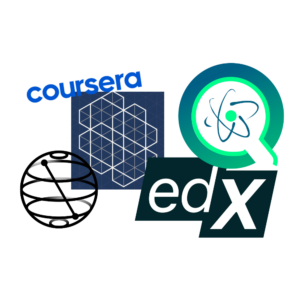
Quantum computing is a rapidly evolving field that promises to revolutionise computing power and unlock new possibilities in various domains, from cryptography to drug discovery. As the demand for skilled professionals in quantum computing grows, many individuals are eager to learn about this cutting-edge technology. We have curated the list of the best courses to learn quantum computing in 2024, covering topics such as how to learn quantum computing, where to learn quantum computing, how long it takes to learn quantum computing, and what you need to know to learn quantum computing.
What Do I Need to Know to Learn Quantum Computing?
To begin learning quantum computing effectively, it is highly recommended to have a solid foundation in a few different areas than just physics:
- Linear algebra: Understanding concepts such as vectors, matrices, and eigenvalues is essential for understanding quantum mechanics and quantum algorithms. It is particularly useful when dealing with quantum states and quantum circuit calculations. To begin understanding how quantum computing works and how to make use of its concepts, linear algebra is definitely the most important skill to have, more important than being able to code.
- Probability theory: Knowledge of probability distributions, random variables, and statistical inference is important for understanding quantum information theory and quantum algorithms. It also allows you to understand measurement results and quantum information in general, since both are probabilistic in nature. Having a solid foundation in probability theory would help you to understand the quantum error correction and designing of optimal error correction codes.
- Computer science: A basic understanding of computer science concepts, such as algorithms, data structures, and computational complexity, can help you grasp the principles of quantum computing. For example, concepts such as time complexity, space complexity, and algorithmic efficiency are crucial in understanding the advantages and limitations of quantum algorithms compared to their classical counterparts. Similarly to data structures in classical computing, in quantum computing, data structures are used to represent and manipulate quantum information, so a good grasp of computer science concepts is beneficial to learn how different quantum algorithms operate.
- Physics: While not strictly necessary, a basic understanding of quantum mechanics and quantum theory can provide valuable context for learning quantum computing. If you want to explore quantum hardware platforms, it’s essential to understand the underlying physics. However, when dealing with quantum computing and algorithms, a complete understanding of quantum mechanics isn’t strictly necessary.
By mastering these foundational concepts, you’ll be well-equipped to dive into the world of quantum computing and learn how to design, implement, and analyse quantum algorithms and applications.
Factors to Consider When Choosing a Quantum Computing Course
When selecting a quantum computing course, there are several factors to consider:
- Prerequisites: Make sure the course aligns with your existing knowledge and skills. Introductory courses may require a basic understanding of linear algebra and probability theory, while more advanced courses may have additional prerequisites.
- Learning format: Consider whether you prefer self-paced learning, live lectures, or a combination of both. Some courses offer video lectures, interactive quizzes, and programming assignments, while others may include live sessions with instructors. The method of learning is unique to everyone, so choose the best format for yourself to start learning.
- Duration: Depending on your schedule and learning goals, you may prefer a course that can be completed in a few weeks or one that offers a more in-depth, long-term learning experience. Some courses are only very short introductions, between 1-5 hours, while others can take up to days to complete.
- Cost: Quantum computing courses vary in cost, with some offering free access to course materials and others requiring a fee for enrolment or certification. Depending on what your goals for learning are, you might want to opt into obtaining a certificate if you want to demonstrate your knowledge and get a job or even join an undergraduate/master’s program if you are more interested in continuing in academia.
- Reputation: Look for courses offered by reputable institutions, such as universities or leading organisations in the field of quantum computing. A good way of differentiating is checking if the course is offered by a university or doing some research into whether the author is a reputable expert in their field. At QURECA, we partner with different subject matter experts to make sure that the courses we offer, and the courses published to our catalogue, are fact-checked and reputable.
By considering these factors, you can choose a quantum computing course that best suits your learning style, goals, and budget.

Introduction to Quantum Computing Courses
One of the best places to start learning quantum computing is with introductory courses that provide a solid foundation in the field. Here are a few top picks:
- Introduction to Quantum Information by KAIST on Coursera: This beginner-friendly, self-paced course offers a detailed introduction to quantum computing, covering topics such as quantum states, operators, quantum gates, circuits, and algorithms. It assumes a basic understanding of linear algebra and probability theory.
- Understanding Modern Physics II: Quantum Mechanics and Atoms by HKUST on Coursera: This intermediate-level course explores the fundamentals of quantum mechanics, atomic physics, and quantum information. It requires some prior knowledge of quantum mechanics and covers topics like wave-particle duality, uncertainty principle, and the Schrödinger equation.
- Qiskit Courses by IBM: The Qiskit online platform provides multiple free courses to start your quantum journey. From the basics of quantum information to variational algorithms, the Qiskit website provides 6 quality courses suitable for any level.
- Microsoft katas by Microsoft: The Microsoft katas are a great introduction to quantum computing! This interactive platform leads you all the way from imaginary numbers to Shor’s algorithm, with added badges that track your progress. If you get confused on certain concepts, there is a built in Copilot AI that is specially tailored to answer your quantum questions.
- Quantum for Everyone 2.0 by QURECA: Our introductory course is another excellent resource to get you started on your quantum journey. With no background required to understand the material, it takes you through the basic terms and concepts, and finishes with an overview of the quantum industry. So, if you want to start off on the right foot, this course is a great place to start! The 2.0 version is also a complete revamp of our previous version with brand new interactive elements to keep you refreshed on the content.
These introductory courses are a great starting point for anyone looking to learn quantum computing, as they provide a comprehensive overview of the field and lay the groundwork for more advanced topics.
Intermediate and Advanced Quantum Computing Courses
Once you have a solid foundation in quantum computing, you can move on to more intermediate and advanced courses that delve deeper into specific areas of the field. Here are a few notable options:
- The Hardware of a Quantum Computer by TU Delft: This course, offered by the Technical University of Delft, is a perfect next step if you’re interested in understanding the different hardware components of quantum computing. You will need to have an understanding of basic quantum concepts
- Quantum Computer Systems Design by UChicagoX: If you are looking for something more software focused, UChicago has a series of great course of EdX. They cover topics like logic gate decomposition, gate scheduling, qubit mapping and memory management, and noisy quantum systems. The series is stretched over 3 different modules, each becoming increasingly difficult and more in-depth into the concepts of quantum programming.
- Quantum Computing Fundamentals & Realities by MITx: This 4-course program is designed for people already familiar with quantum computing but want to expand their repertoire into different use cases. This course will help you understand the true possibilities and advantages of quantum computing while getting hands-on experience.
These intermediate and advanced courses are suitable for individuals who have a good grasp of the fundamentals of quantum computing and want to delve deeper into specific areas of the field.
Quantum Computing Courses with a Focus on Applications
In addition to theoretical and algorithmic courses, there are also courses that focus on the applications of quantum computing in various domains. Here are a few examples:
- Quantum Machine Learning by IBM: While these Jupyter notebooks from Qiskit are outdated, the concepts outlined in them are not! Before Qiskit Quantum Learning, the Qiskit textbook used to be the go-to resource to learn all about quantum computing, but the textbook is still very accessible on GitHub. It contains a whole series on quantum machine learning with example notebooks and explained concepts behind how quantum machine learning works. While the notebooks are made on an older version of Qiskit, the ideas and concepts they outline are still as relevant as ever!
- Topology in condensed matter: typing quantum knots by TU Delft: While not explicitly quantum computing, topology in condensed matter could have some fascinating potential for it, and if you are more inclined to a theoretical approach this is the course for you. Majorana modes were one of the strongest contenders to realize a quantum computer but hasn’t been realized yet and the research around creating Majorana modes has been met with a lot of scrutiny. But, this course is great to learn what they are, topological states in matter, and to introduce yourself to condensed matter physics!
- Quantum Strategy for Business by Brian Lenahan: If you are looking to learn more about the business of quantum computing, Brian’s got you covered! This course gets students ready to tackle quantum business and goes through different strategies for business to accel in the quantum ecosystem. It discusses leadership roles, technologies to be aware of, and scalability plans to integrate quantum into current businesses.
These application-focused courses are ideal for individuals who are interested in the practical implications of quantum computing in specific domains and want to learn how to apply quantum computing techniques to real-world problems.

How Long Does It Take to Learn Quantum Computing?
The time it takes to learn quantum computing depends on several factors, such as your prior knowledge, learning pace, and the depth of the course material. Generally, introductory courses can be completed in a few hours up to weeks, while more advanced courses may take several months to a year or more.
It’s important to note that learning quantum computing is an ongoing process, as the field is rapidly evolving and new concepts, algorithms, and code bases are being created every day. Staying up to date with the latest developments and continuously learning new concepts and techniques is crucial for anyone interested in pursuing a career in quantum computing.
Conclusion
Learning quantum computing in 2024 is an exciting opportunity to gain knowledge in a rapidly evolving field that promises to transform various industries. With a wide range of courses available, from introductory to advanced, and from theoretical to application-focused, there is something for everyone interested in learning quantum computing.
By choosing the right course, considering your learning goals and prerequisites, and dedicating time and effort to mastering the fundamentals, you can embark on a rewarding journey in the world of quantum computing. Whether you’re looking to pursue a career in this field or simply want to stay informed about the latest developments, learning quantum computing is a valuable investment in your future.
